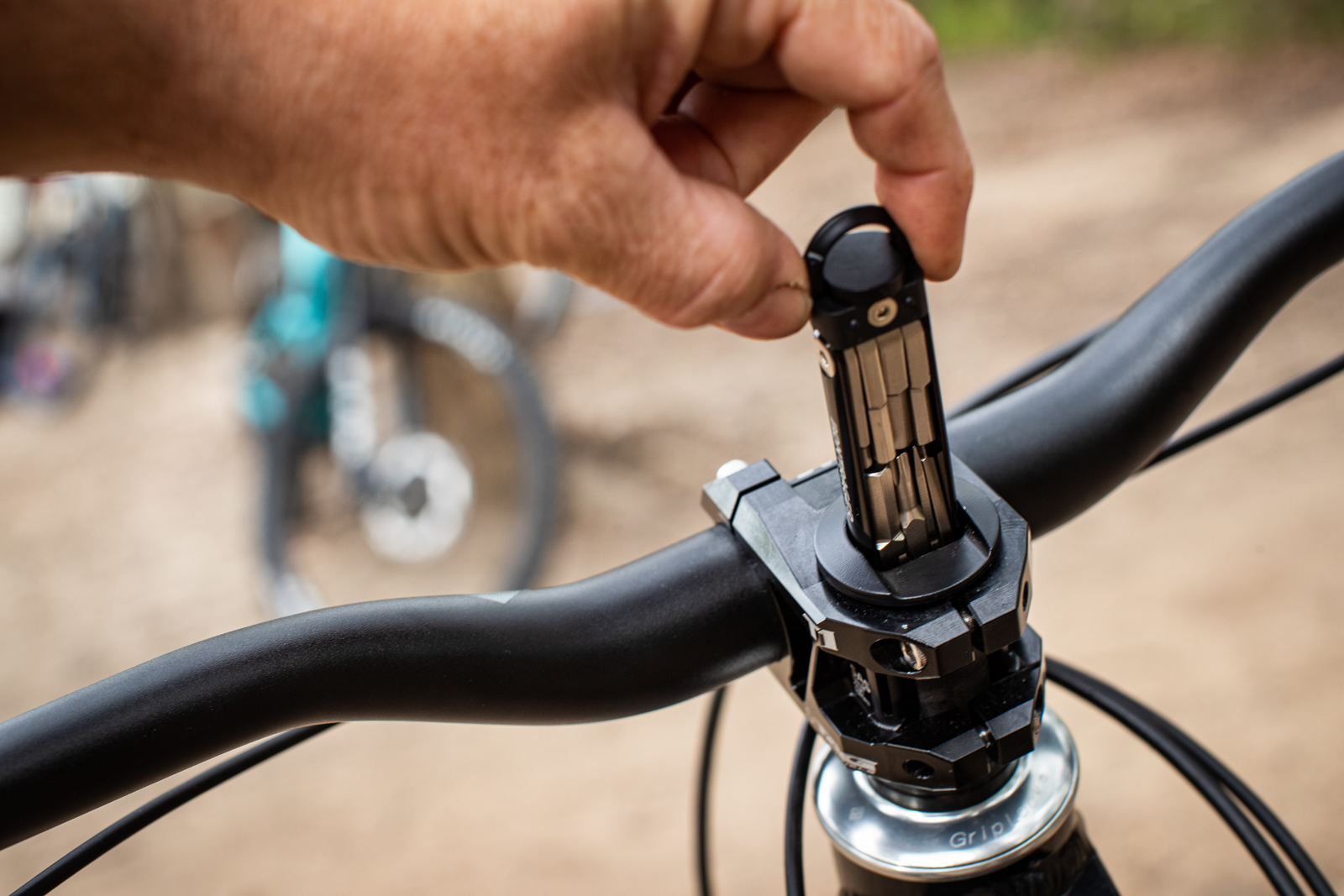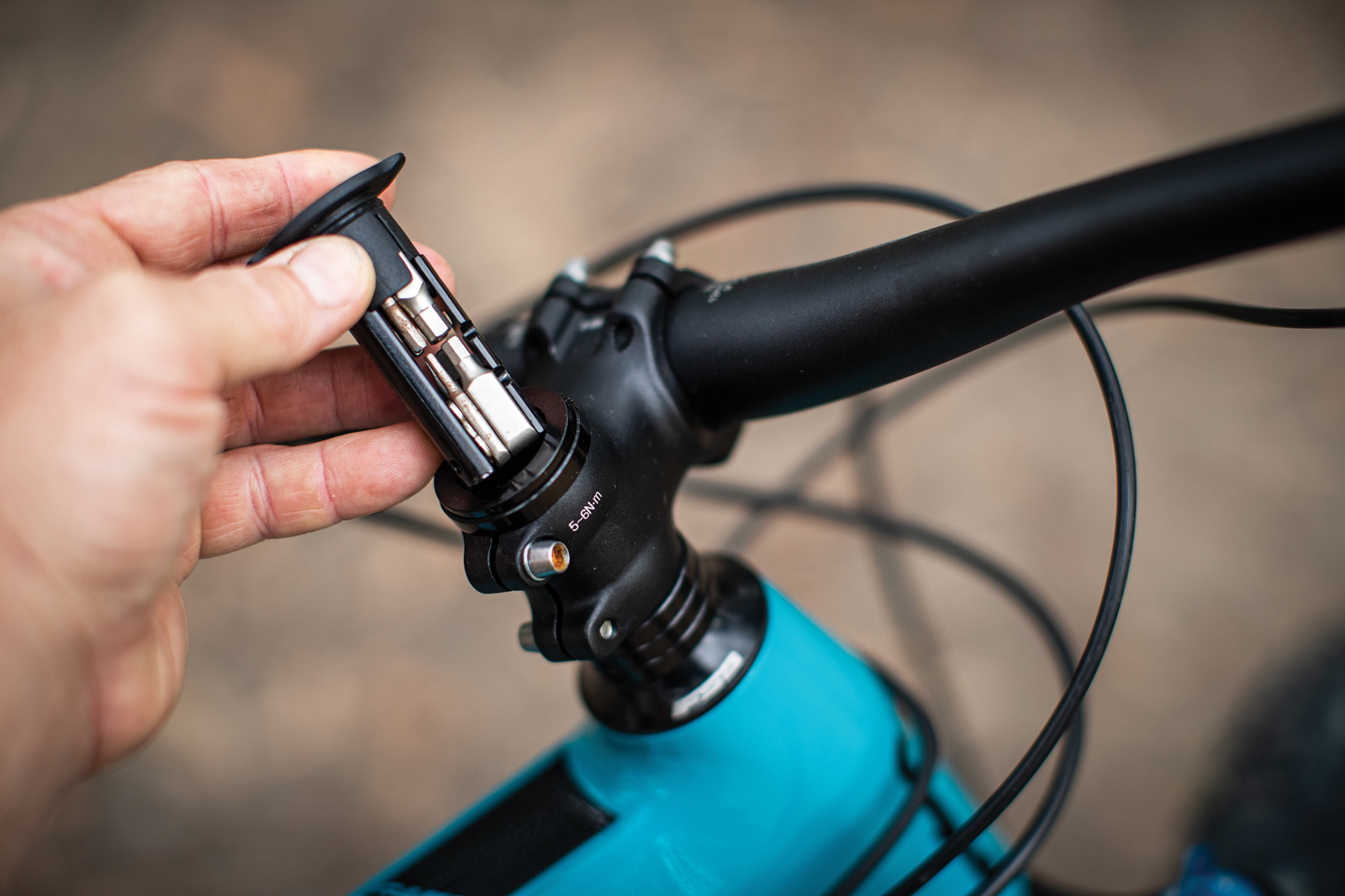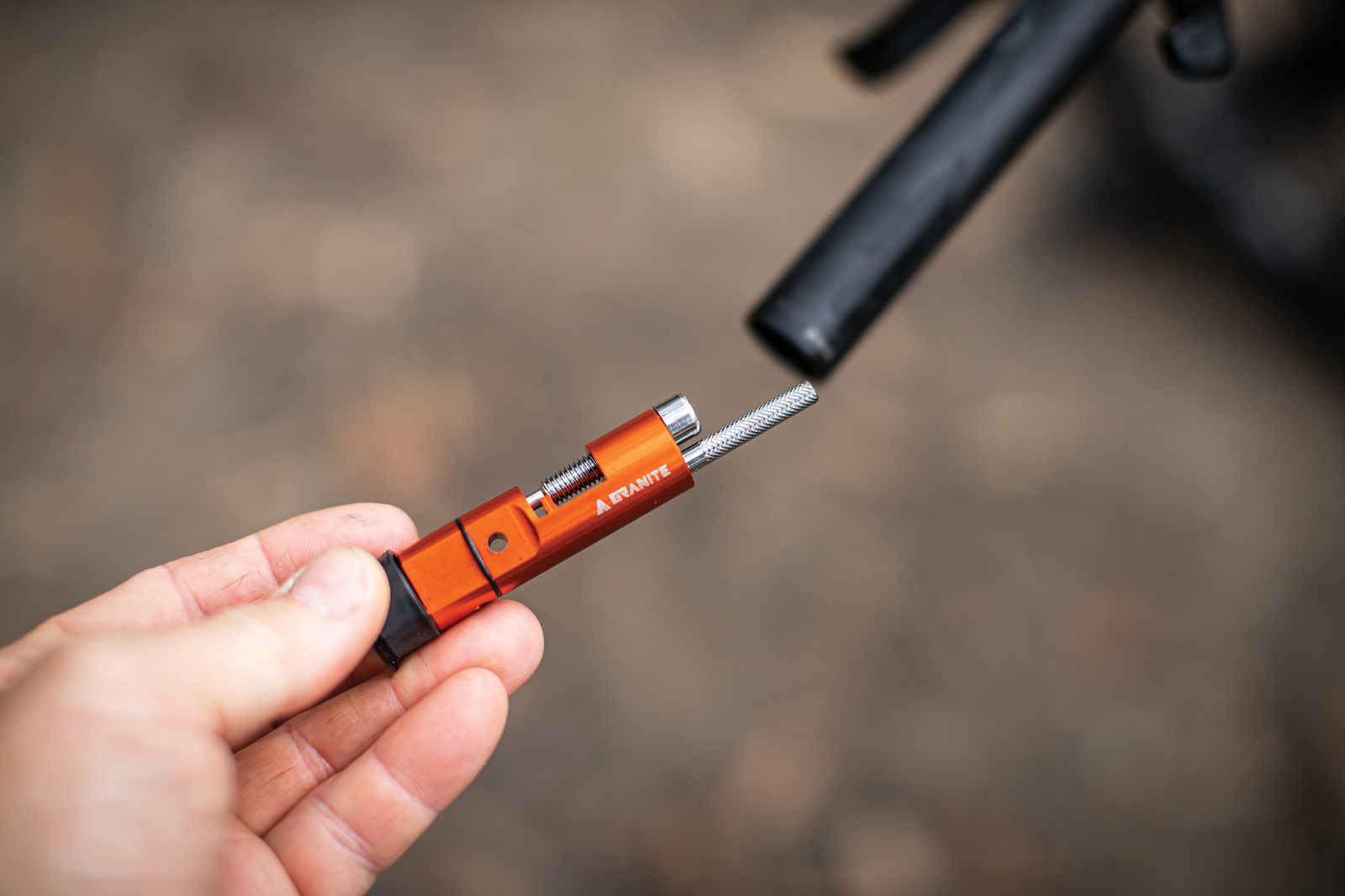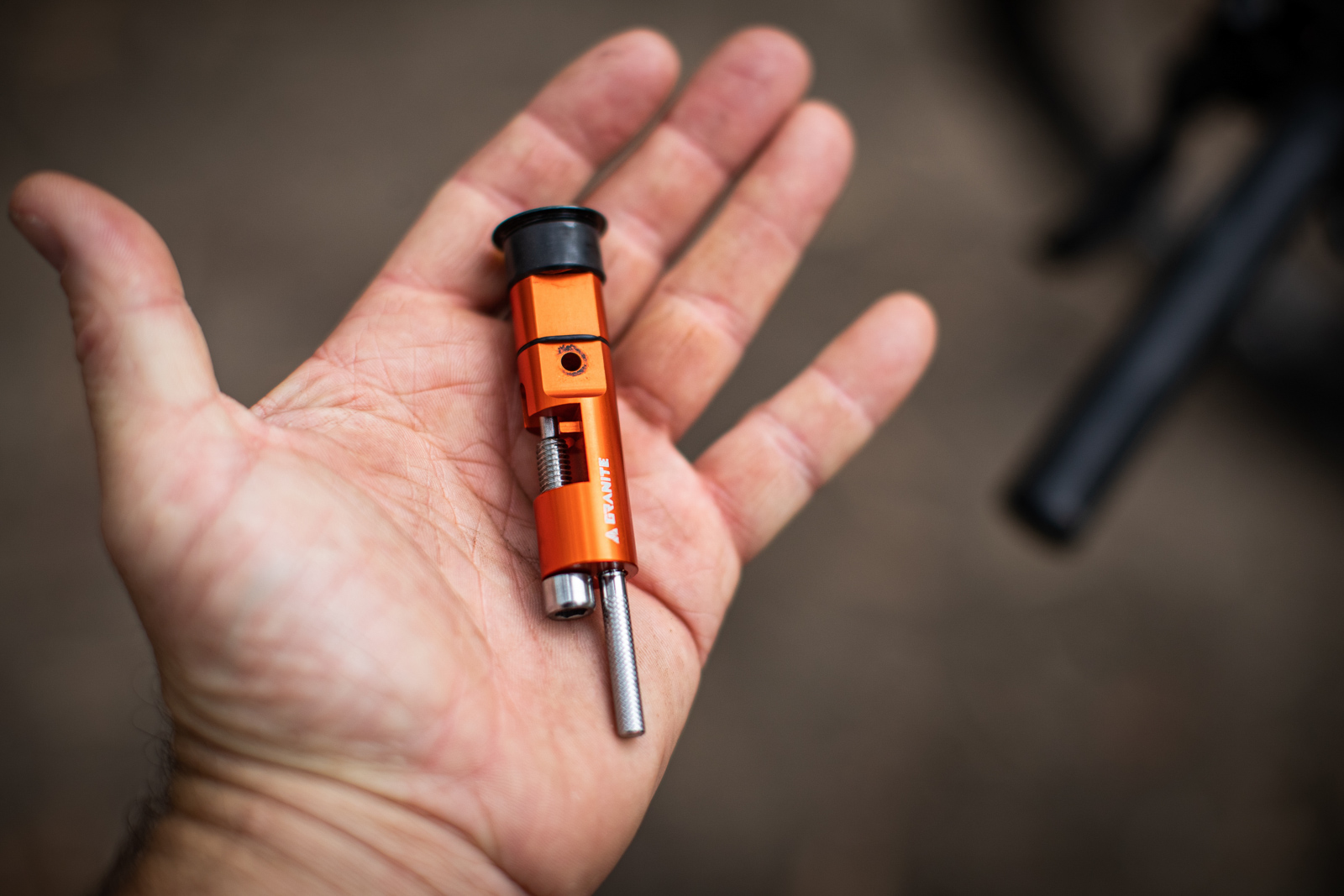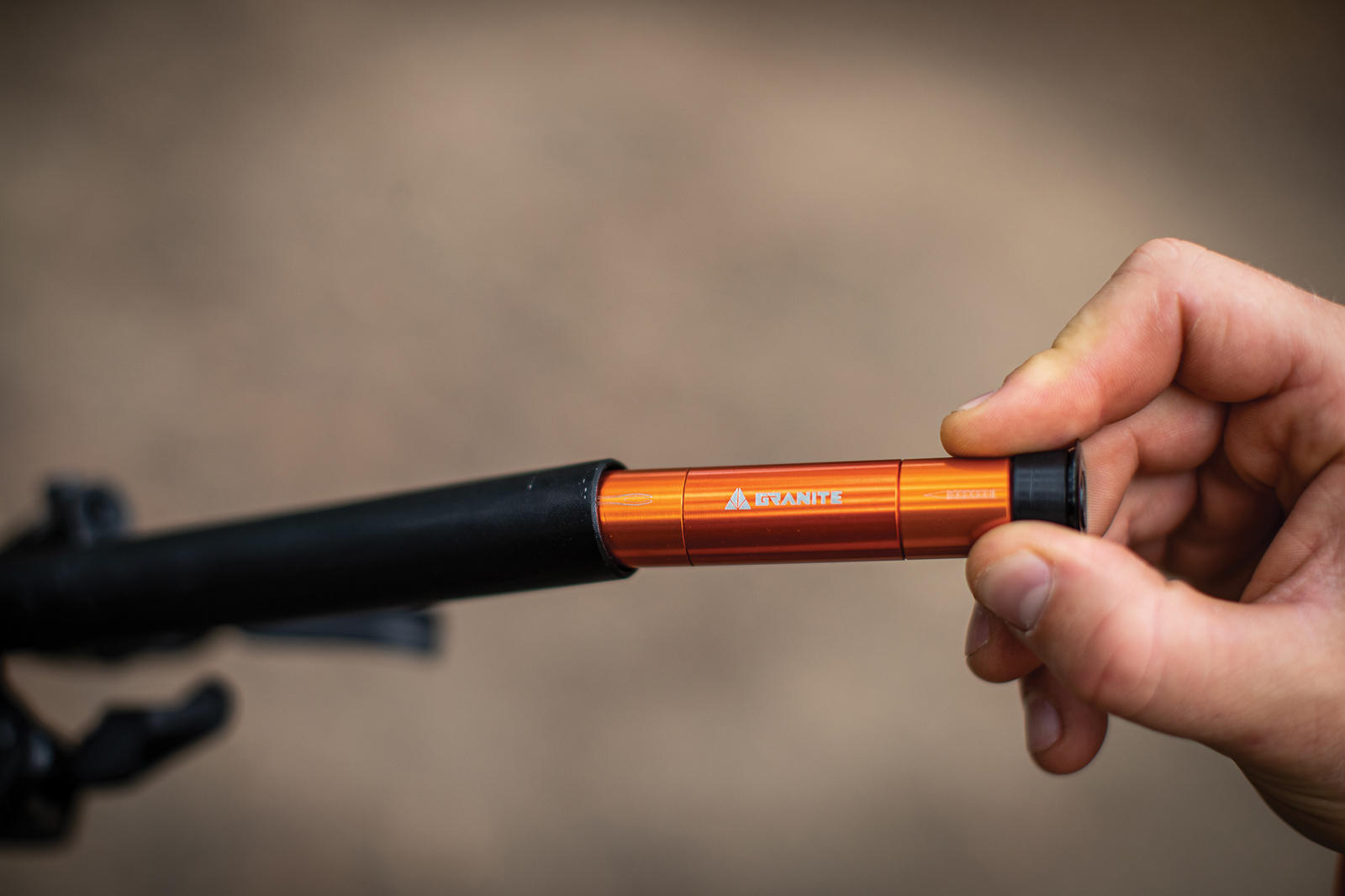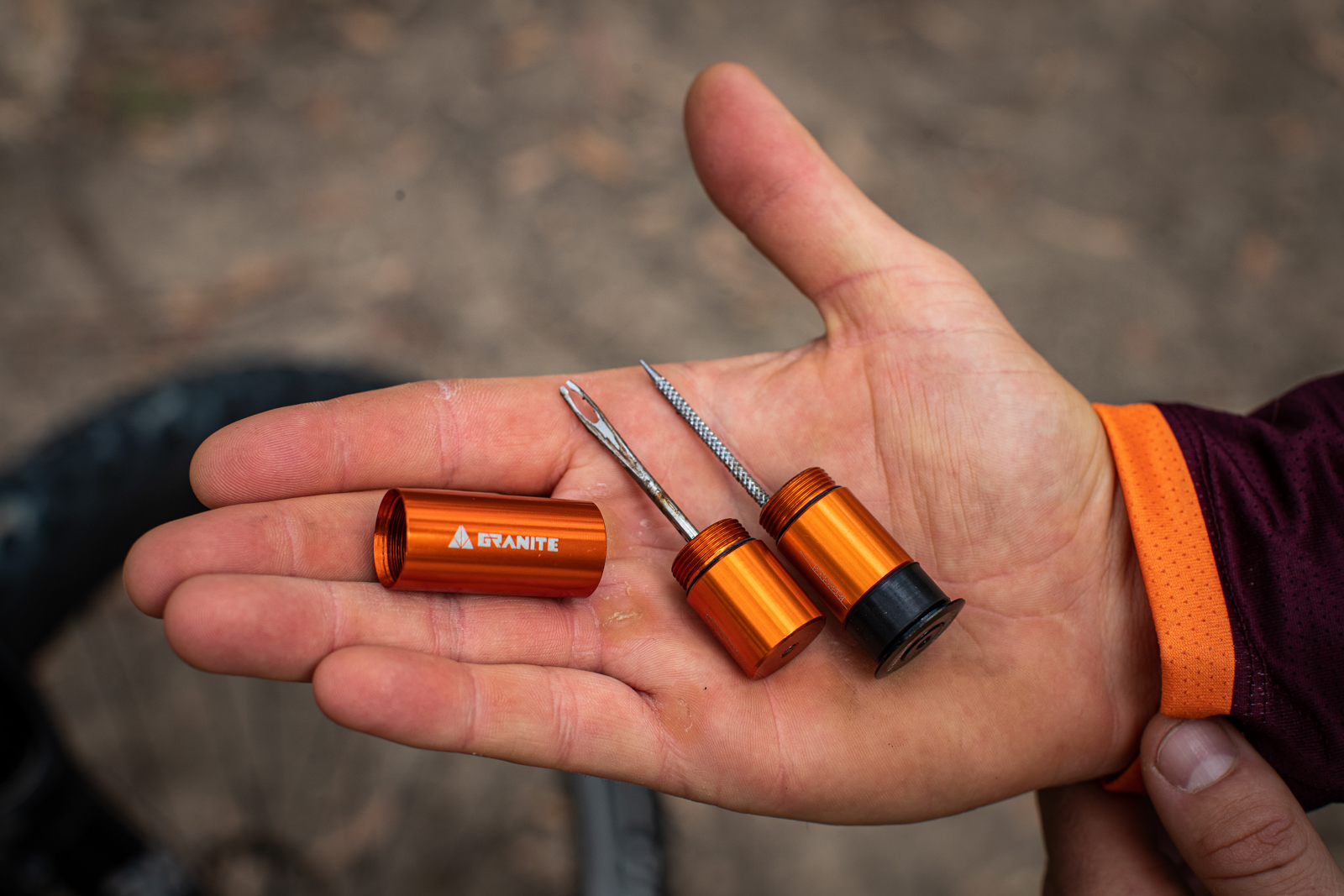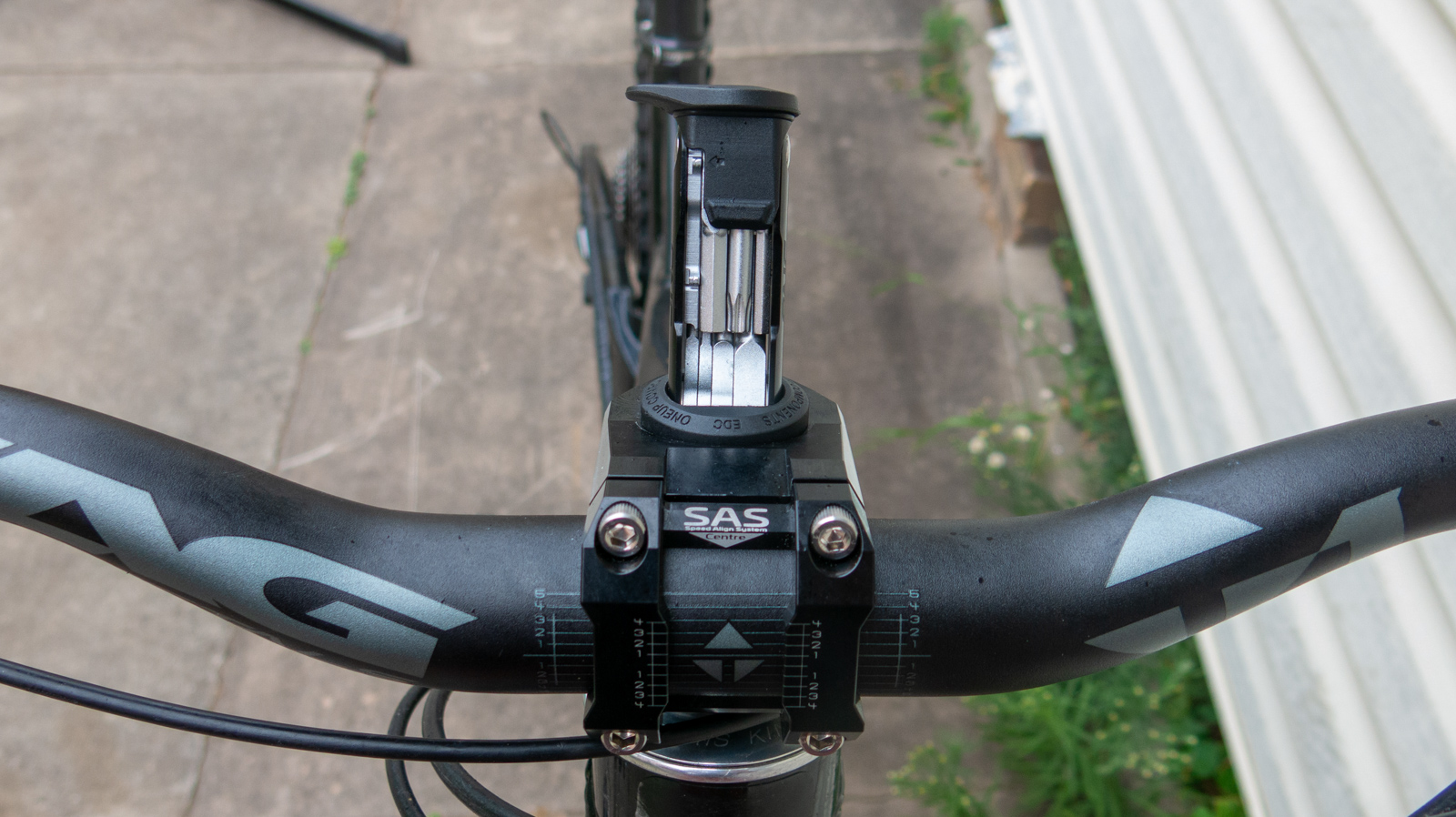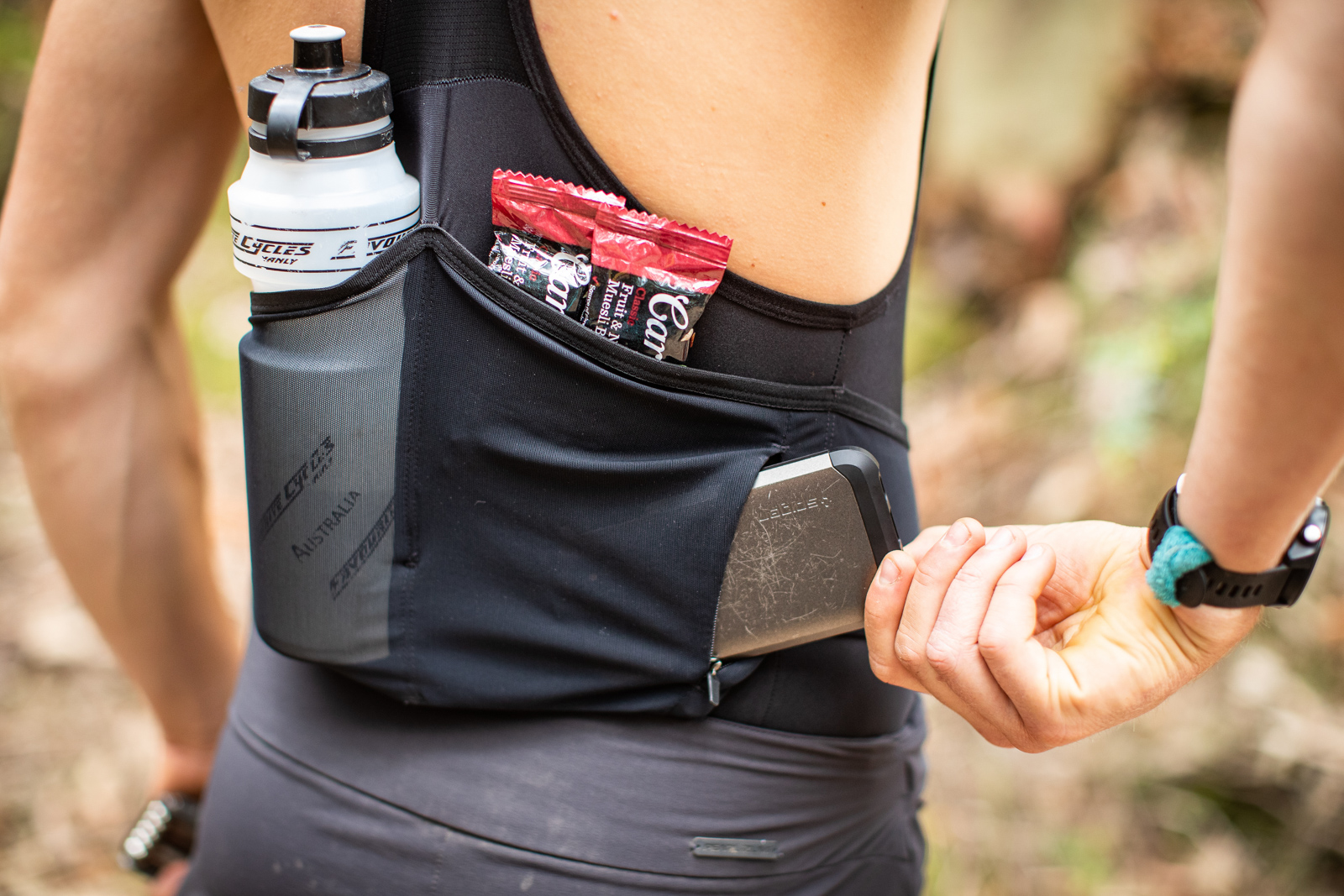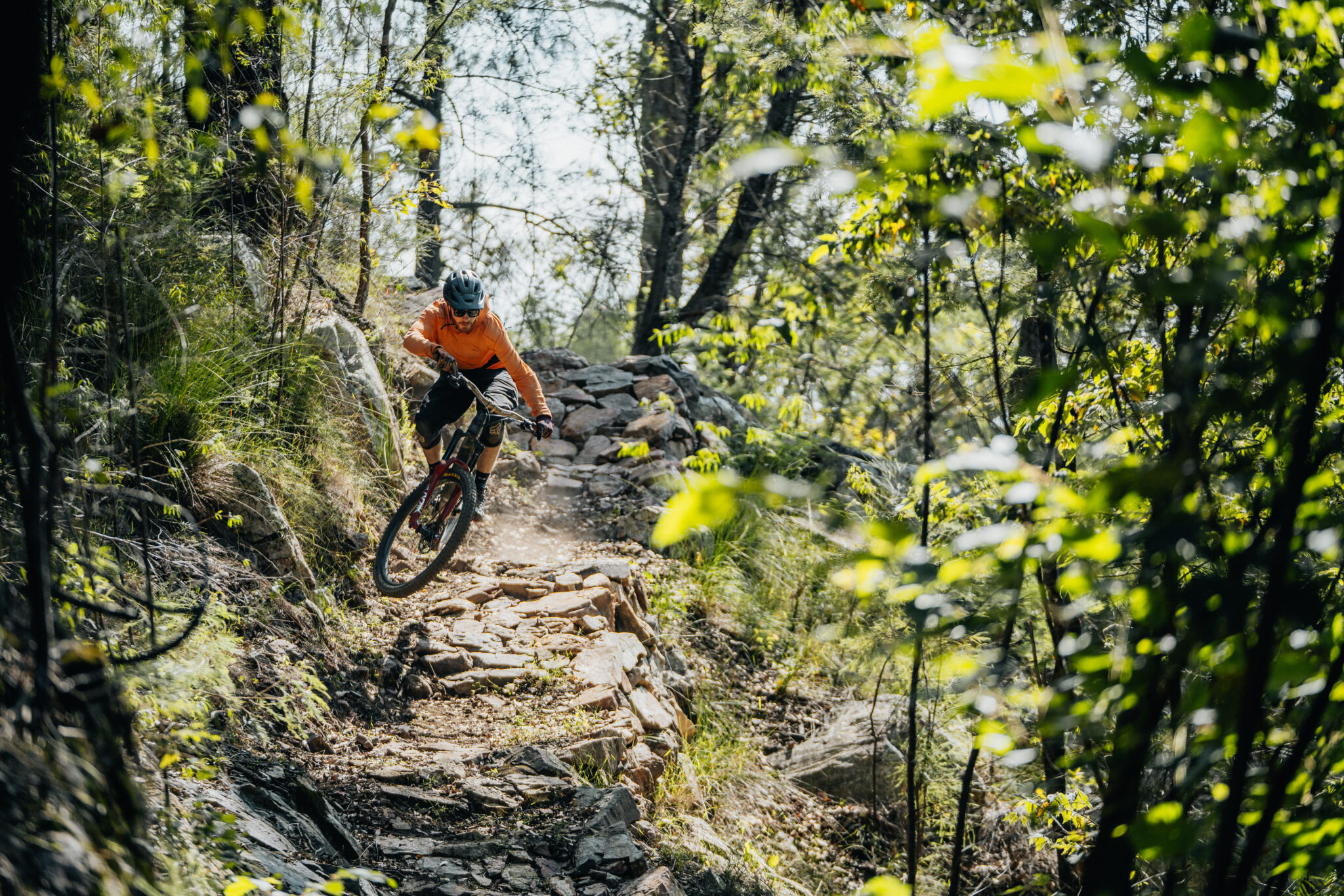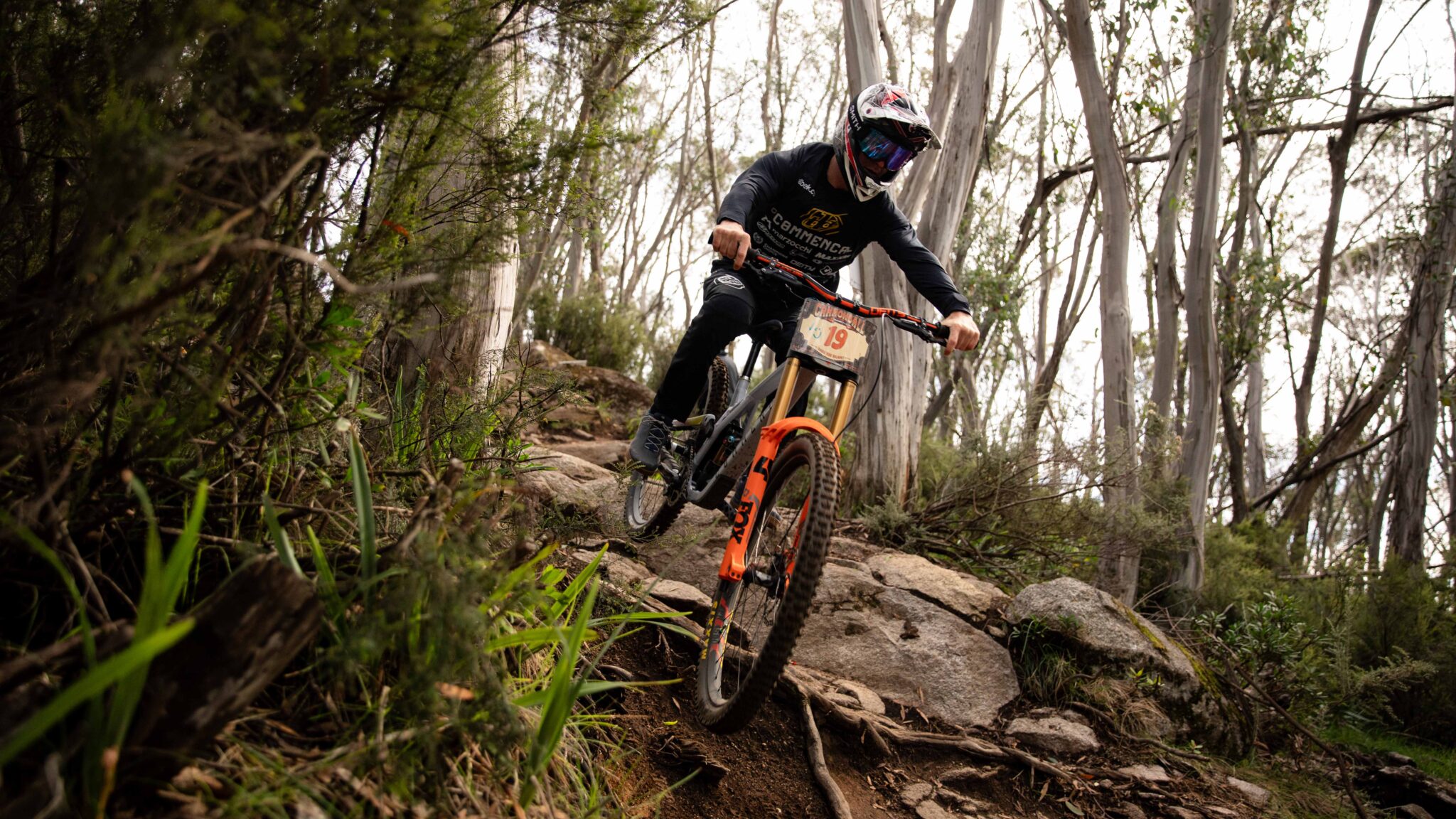Going packless but not going without
Hate wearing hydration packs? Will Shaw looks into how you can carry the spares you need on your bike, and on yourself.
Words: Will Shaw
Photos: Tim Bardsley-Smith, Will Shaw
If you headed to an XC or enduro race a few short years ago, hydration packs reigned supreme. Nowadays there are more bare backed riders than ever before. These riders use clever on-bike and on-body storage to eliminate the need for a backpack to store spares and nutrition.
A popular on-bike storage solution of the last few years has been the emergence of multi-tools hidden inside your steerer tube. Whilst the original exponent of this in is undoubtedly the One Up EDC, newer options on the market mean you don’t have to thread your steerer, making installation easier for the home mechanic.
Here’s a look at some of the more popular options for storage on the bike and on the rider. I’ll look into the performance, pros and cons of each of these items to see what the best fit for you might be.
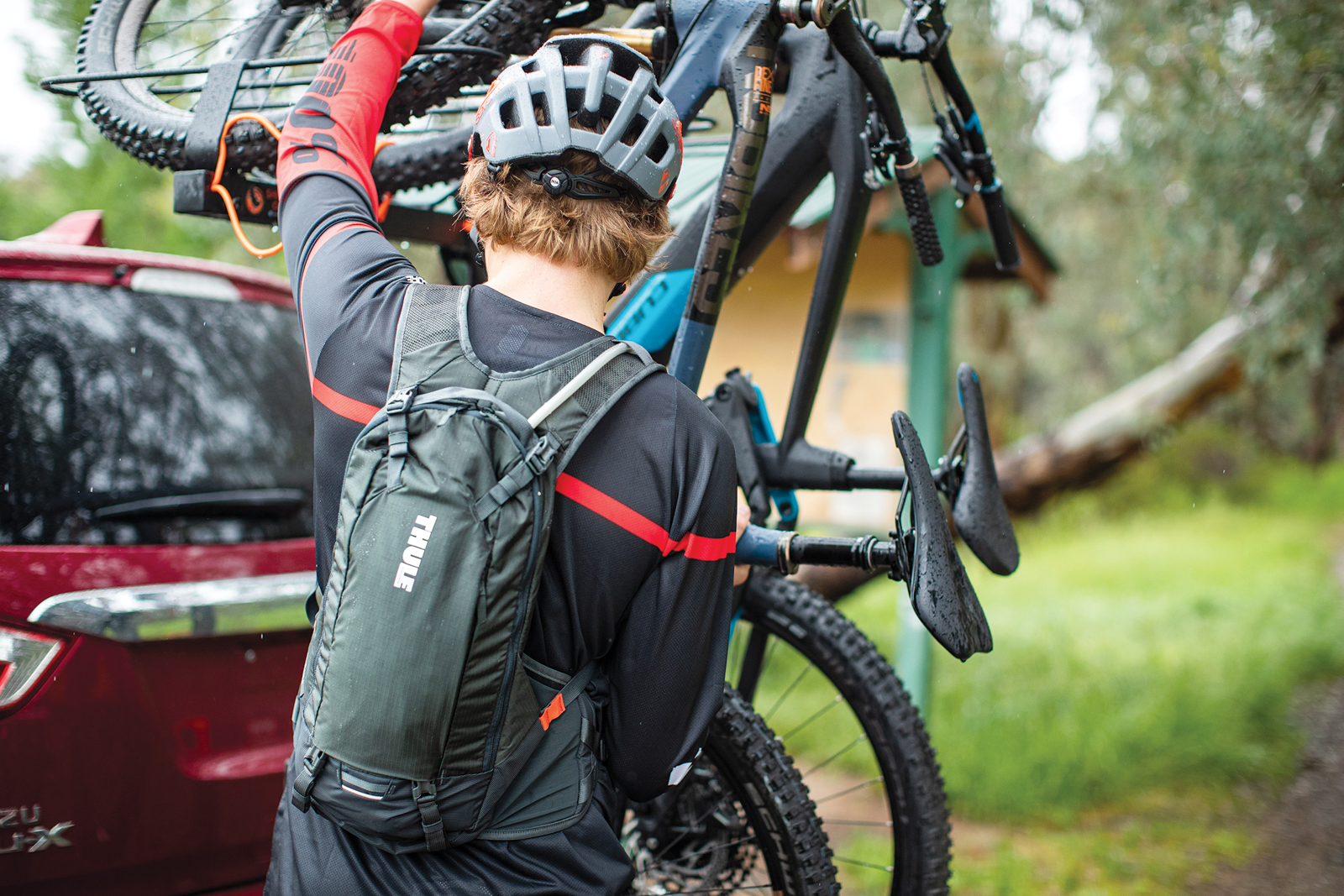
Bontrager BITS Integrated MTB Tool:
The Bontrager BITS is hidden within your steerer tube, but it doesn’t require you to thread your steerer. The BITS gets around this by connecting the top and bottom of your steerer. The bottom plug allows you to preload your headset bearings, and as an added bonus keeps gunk out of your steerer. The top plug features a cavity in which the tool resides.
The BITS hit the scales at 164 grams, which is heavier than the Granite Designs Stash Multi-Tool, but 11 grams lighter if you include the Granite Handlebar Chain Tool that comes as standard on the Bontrager (the Stash Multi-Tool doesn’t have a chain tool). Compared to the EDC lite, the BITS comes in at 75 grams heavier, however the Bontrager is a far more complete tool.
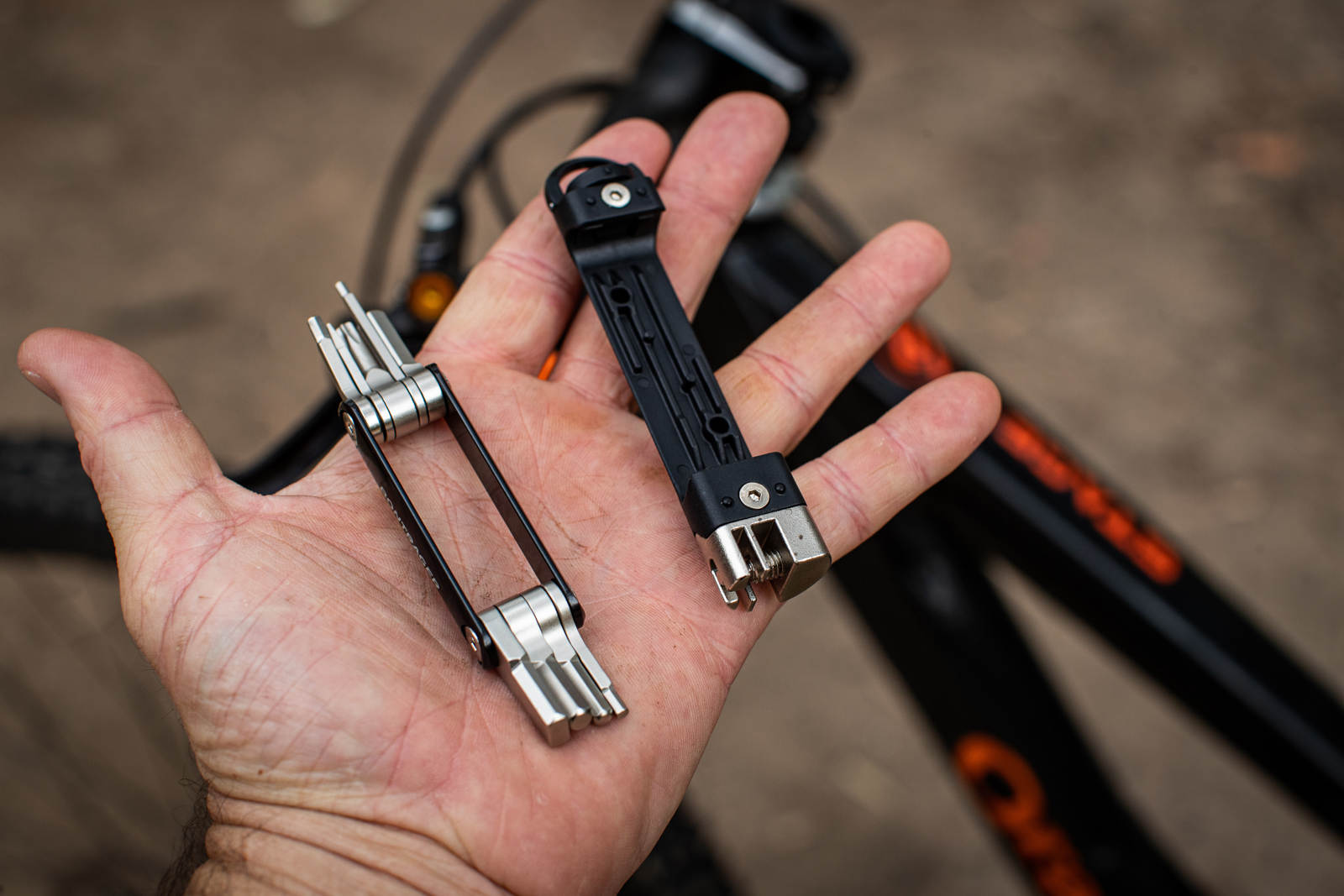
The BITS is a breeze to install, with a couple of bolt options depending on the length of the steerer tube the tool is being installed into. The BITS tool cannot be installed into ovalised steerers such as the Fox 38. When you open the box that the tool comes in there’s useful installation instructions that make setting up the BITS a breeze.
Alongside the two bolts, Bontrager use a series of spacers in different heights (much like headset spacers) to customise the fit. Installation is a quick and easy procedure once you’ve banged the star nut out of your steerer. You can do this using a hammer and a punch, but if you don’t feel comfortable doing this it’s an easy job for a bike shop. The BITS will fit steerers from 165mm to 250mm.
The BITS tool has 2, 2.5, 3, 4, 5, 6, and 8mm allen keys, a T25, flat head screwdriver, chain breaker, valve core remover, and clever storage for a quick link. Considering the space that it’s stored in the BITS packs a solid array of tools, but there are some things missing that are worth noting.
Firstly, the 8mm is a half contact tool, so combined with the small size of the tool, it’s not going to give you a whole heap of available torque. Whilst it’ll definitely get you out of trouble, a traditional multi tool with the full hex head would be better in the situation where you need to do something up fairly tight, for example a crank arm. It’s a similar situation with the 6mm, which features a cut-out to fit the 2mm allen key.
Secondly, there’s no spoke keys, which is something that’s integrated with many other multi tools as a part of the chain breaker. This is a point of difference for me, as having spoke keys (which the Granite Multi-Tool has) can be the difference between having your tyre rub paint off your chainstay all the way home or not.
My third criticism is how difficult it is to get the tool out of its cradle. As the handle is quite small, it’s difficult to get the leverage required to pull the tool out of its cavity. While the BITS’ tightness is frustrating, it probably contributes to the lack of rattling from the tool, so perhaps you can’t win them all on this front.
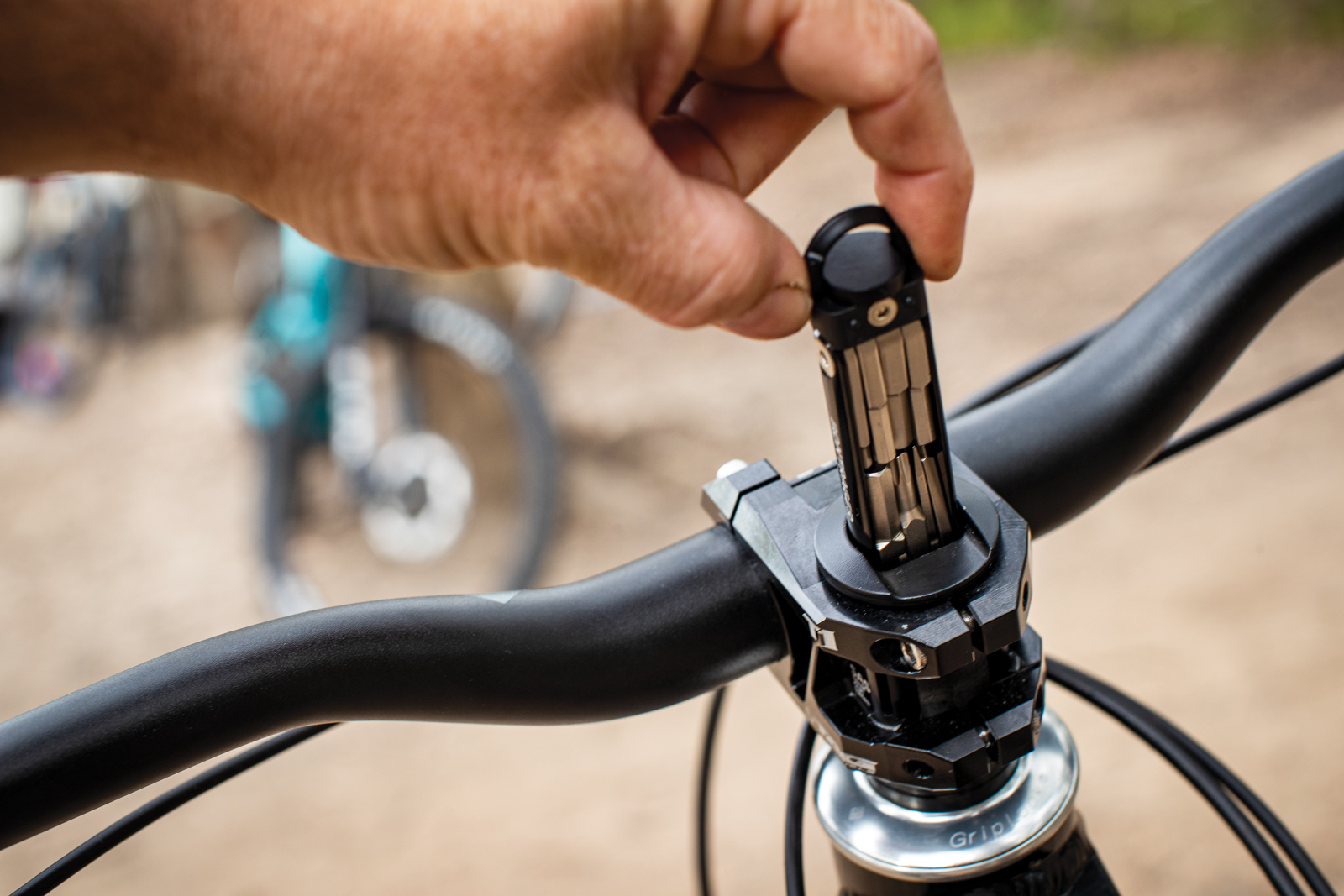
Lastly, the price of the BITS is worthy of mention. At $140, it’s a fair bit of cash for what is essentially a multi tool with a chain breaker. For less than that price, you could get the Granite Multi Tool, Chain Tool, and Tyre Plug kit. This being said, the Granite Multi Tool is missing an 8mm, something I see as essential.
In terms of the performance of the tool out on the trail, the BITS gets the job done, but due to its small size getting to some bolts is quite fiddly. The lengths of the bits are slightly longer than the Granite, however it’s the EDC that wins in the tool useability stakes quite easily. This is due to bits that are twice the length of the Granite, and 1.5 times the length of the BITS.
Whilst I have criticisms of the BITS, the tool is easy to install, functional, and does what it claims to. If you’re the kind of rider who appreciates discreet on bike storage, and you aren’t truing your wheels mid ride regularly, the BITS has what you need 99 percent of the time.
Price: $140
From: https://www.trekbikes.com/au/en_AU/bontrager/
Hits:
- Good spread of tools
- Decent tool bit leverage for the size of the tool
- Good quick link integration
Misses:
- Quite expensive
- Bloody hard to get out of its cradle
Granite Designs Stash Multi-Tool:
The Granite Designs Stash Multi-Tool is a another high quality steerer mounted multi-tool. Comparable to the BITS, this tool uses caps at either side of the steerer to provide the correct headset compression, with a cavity in the top half of the steerer where the tool is stored.
Installation is a breeze once you’ve removed the steerer’s star nut, and the Granite worked perfectly with the Fox 38, unlike the BITS. This tool will work for bikes with a distance from the bottom of the fork crown to the top of the stem between 150mm and 240mm, which should work for most riders.
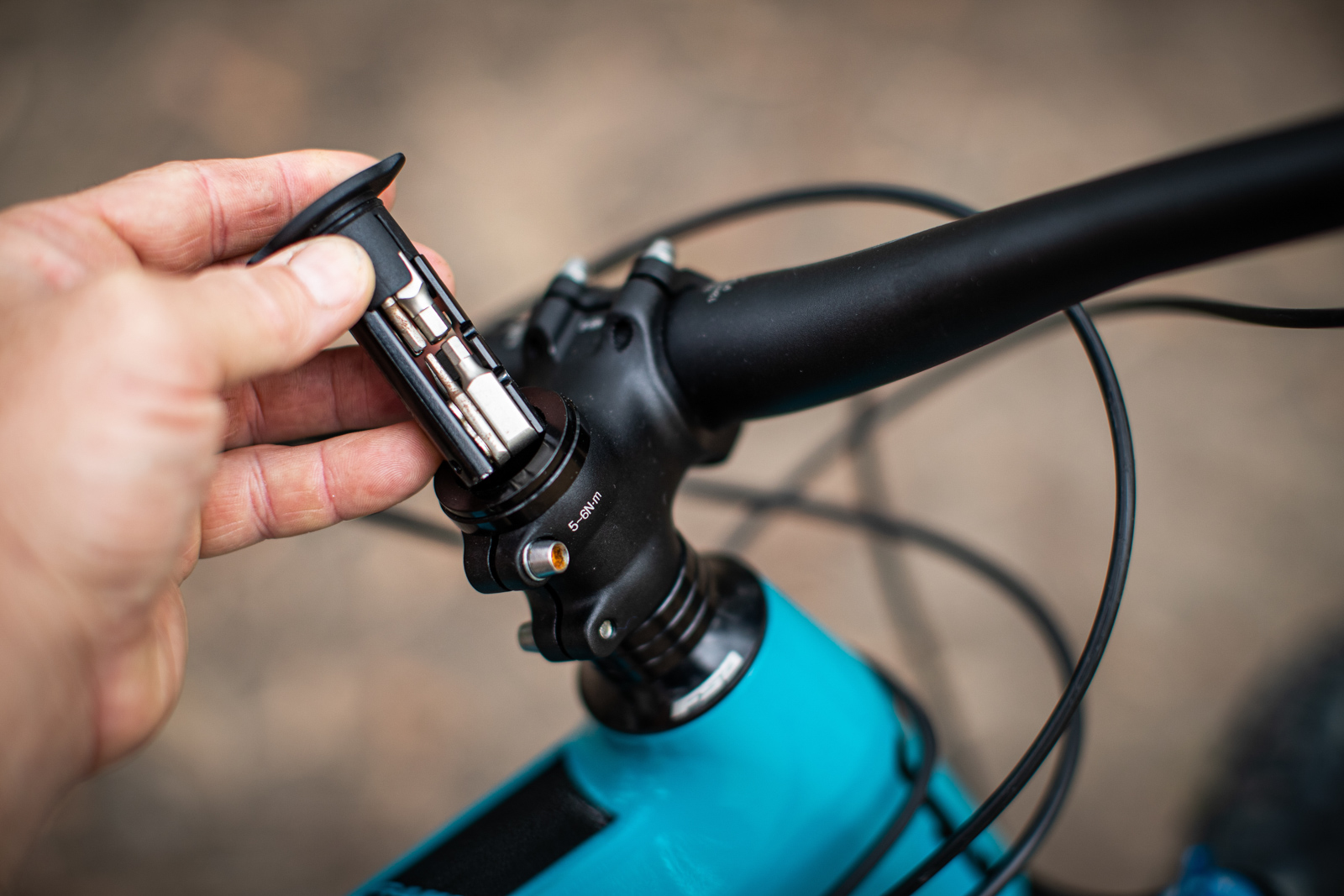
This multi-tool has 2, 2.5, 3, 4, 5 and 6mm allen keys, as well as a T25, flat head, 4 varieties of spoke keys, and a valve core remover. Whilst the spoke keys and valve core remover are very useful, my big gripe with the multi-tool is the lack of 8mm. The separate tool that has the spoke keys and valve core remover would also be easy to lose, as it’s a separate piece to the main multi-tool (although it does attach magnetically) and is held in place by a single clip once the main tool is removed.
Other than those two gripes, the Stash Multi-Tool is a high-quality piece of kit. The insertion and removal of the tool is far better than the BITS, with a simple O ring providing the necessary tension to keep the tool in place with no rattling. On the trail, the tool bits do the job, however they are the fiddliest of the three tools tested due to their short bit length.
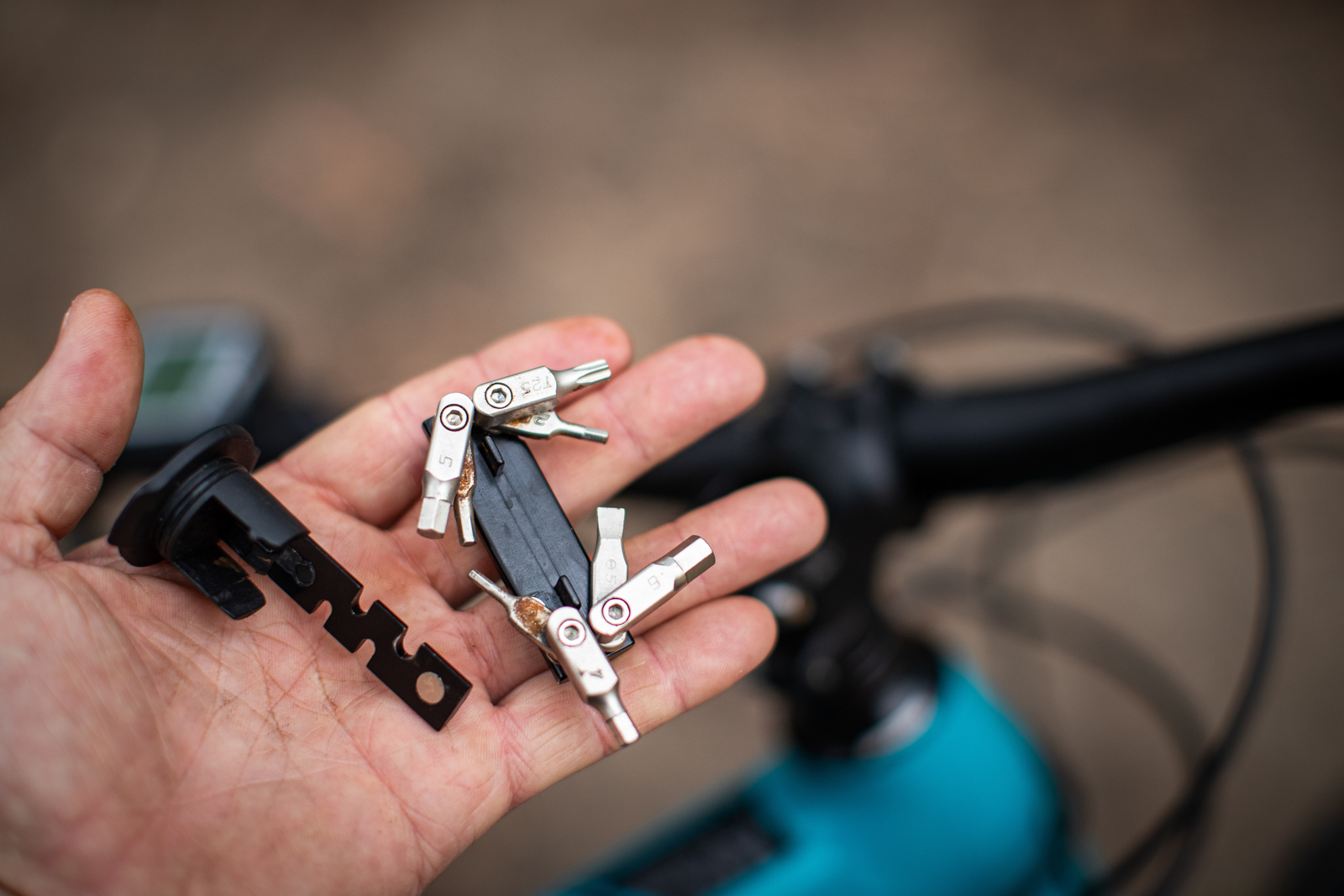
At $79.95 the Stash Multi-Tool would be a steal if they’d managed to integrate an 8mm!
Price: $79.95
From: http://www.linksports.com.au
Hits:
- Well priced compared to the competition
- The easiest to get in and out of your steerer
- Inclusion of the spoke tools and valve core remover is clever
Misses:
- Lack of 8mm
- Spoke keys and valve core remover are easy to lose
Granite Designs Stash Handlebar Chain Tool:
The Granite Designs Stash Handlebar Chain Tool is a chain tool that’s stored inside the end of your handlebar, which is designed to work with their Stash Multi-Tool. A multi-tool is required additionally to this tool, to both remove your grip and the tool from the handlebar, and also to drive the pin to break chain links. The tool weighs 48 grams.
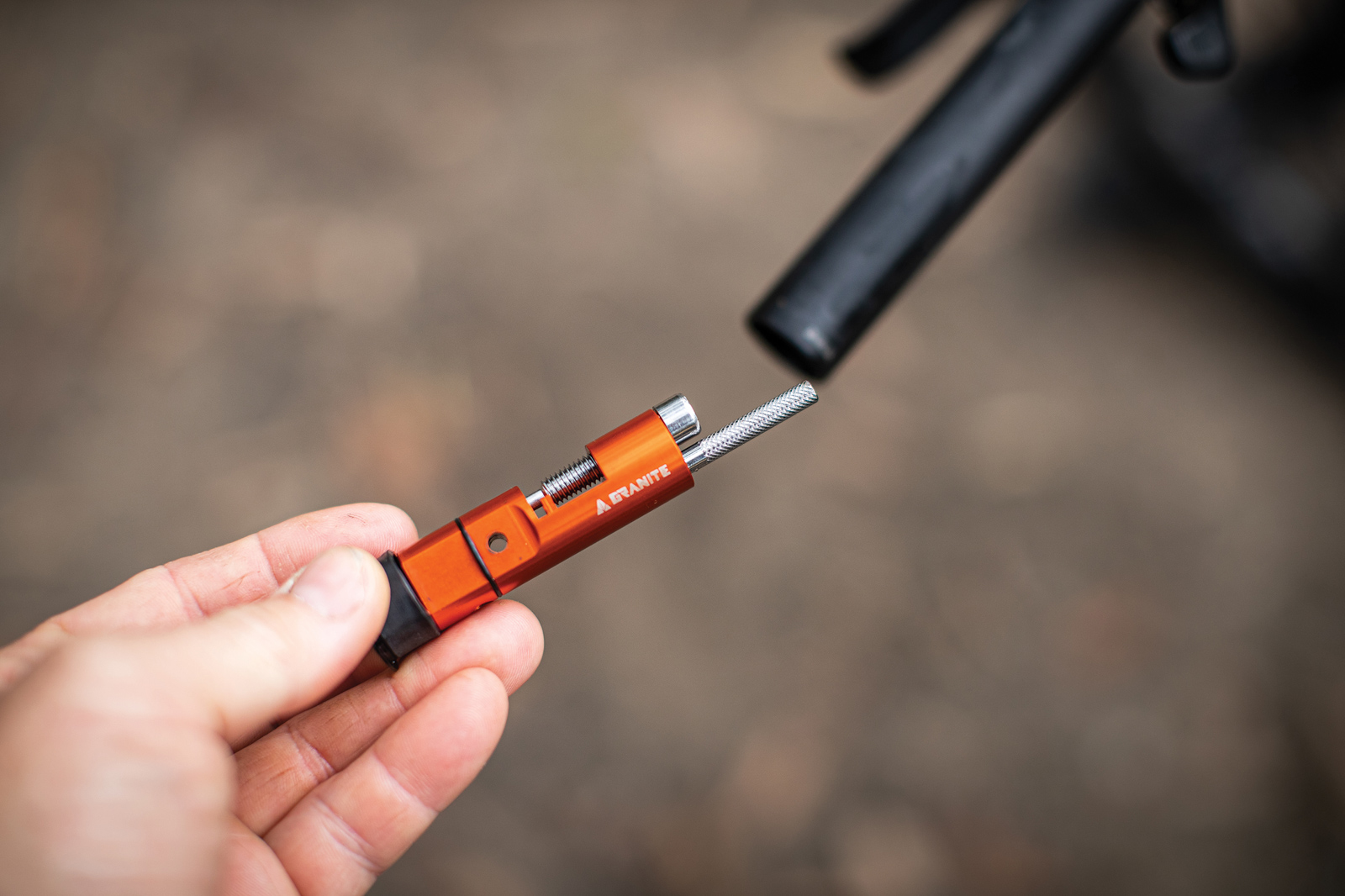
Out of the box, the tool’s finish is noticeably high quality. There’s a pin threaded into the tool, which acts as a handle when the tool is in use. The driving pin is also threaded into the tool, to avoid rattling during riding. There’s two holes that provide space for a quick link to be stored with the tool, which is secured via a handy O-ring, and the tool stays put inside the handlebar via a simple expanding rubber spacer system. The tool can be used with both single sided and dual sided lock on grips, and two separate end caps are provided for this.
In terms of usage, this tool is much nicer to use than the chain tools that come as an attachment on a multi-tool. Having the handle provides better stability and leverage, and if you’re a bit heavy handed on the tools like me, then the extra stability is much appreciated. The handle did rattle loose on me in my first ride, but when I cranked it back up tight it didn’t make a noise throughout the rest of testing.
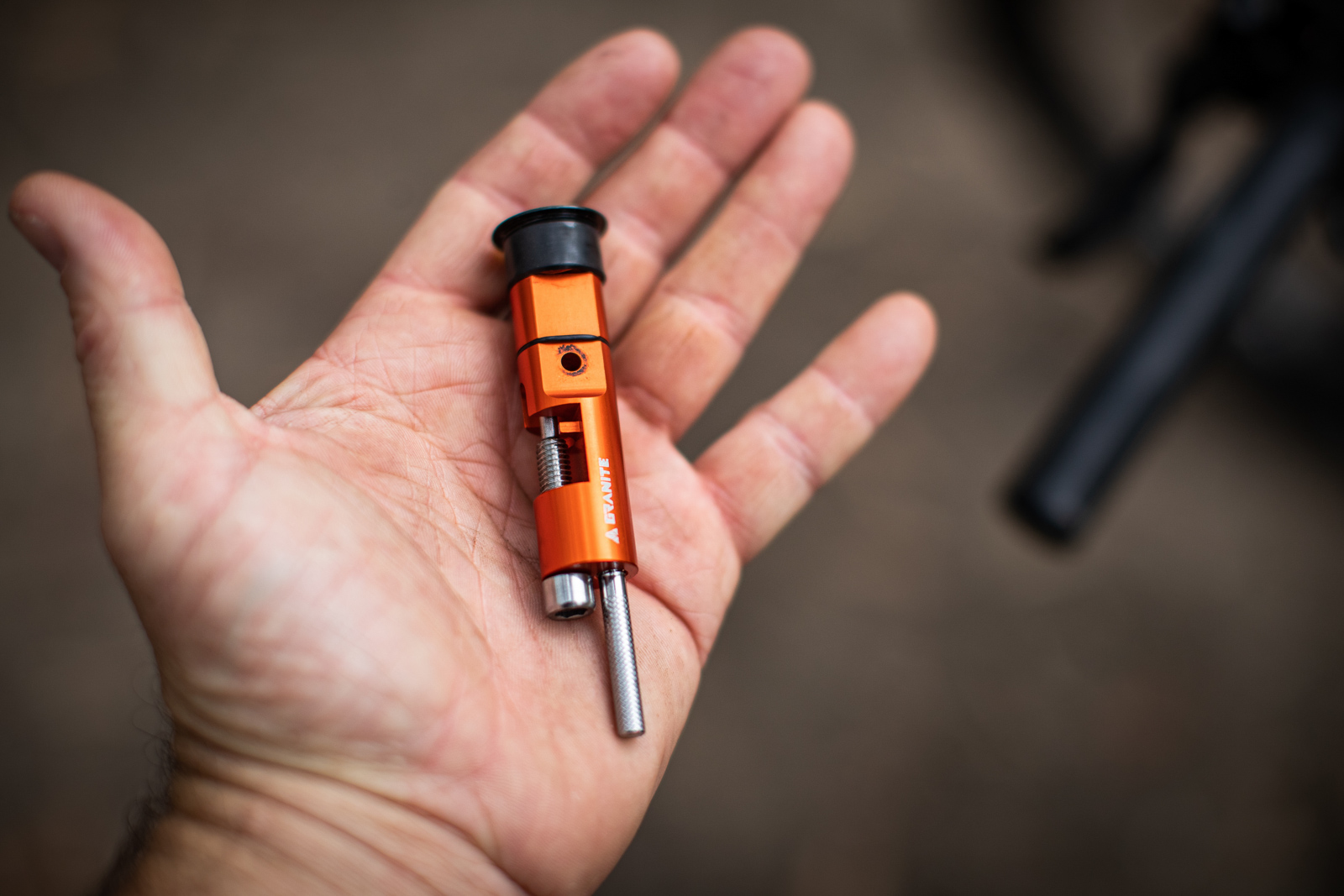
The tool retails for $34.95. Whilst a quick Google search reveals that you can get a multi-tool with a chain breaker for less than the cost of this single tool, if you’re going all in on integration, and you want to work with a higher quality tool out on the trail, then this chain tool is definitely worth a look.
Price: $34.95
From: http://www.linksports.com.au
Hits:
- Much better leverage and stability than an integrated multi-tool chain tool
- Great construction quality and finish
- Handlebar integration is clever
Misses:
- More expensive than a multi-tool with an integrated chain tool
Granite Designs Stash Tyre Plug:
The last tool I received from Granite was their Stash Tyre Plug. The Stash Tyre Plug has the same high-quality construction as both of the other Granite tools I received. The Tyre Plug is stored inside the handlebar using the same expanding rubber spacer system as the Chain Tool, and there’s no rattling as both the temporary plug and the plug itself thread into one another.
The Stash Tyre Plug also accepts both single sided and dual sided lock on grips and comes with two bar end plugs accordingly. There’s also four tyre plugs that come with the tool that fit nicely inside the tool when it’s screwed together.
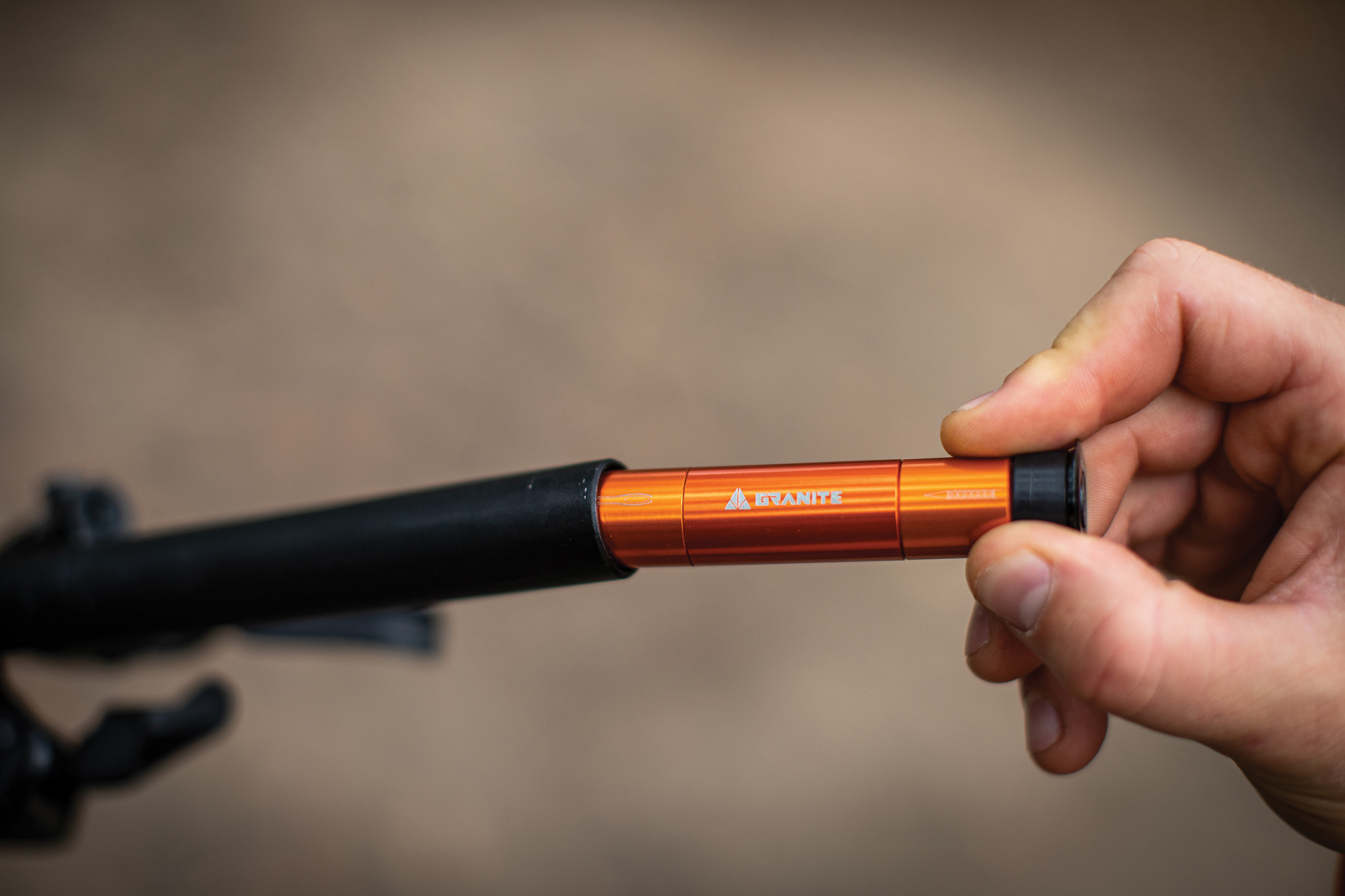
The tool itself functions flawlessly, with one rather large caveat. By the time you’ve undone your grip and removed the tool using a 3mm allen key, your tyre is probably fully flat. If you’re just out for a ride this isn’t an issue, as the tyre is still beaded despite being flat. In a a race situation there are better options out there, such as simply having a Dynaplug Racer or Stan’s DART in your pocket.
The Stash Tyre Plug retails for $29.95. If you’d prefer to pump your tyre up from flat when you do get a puncture as a trade-off for storing a tyre plug in incognito fashion, the Stash Tyre Plug is worth a look.
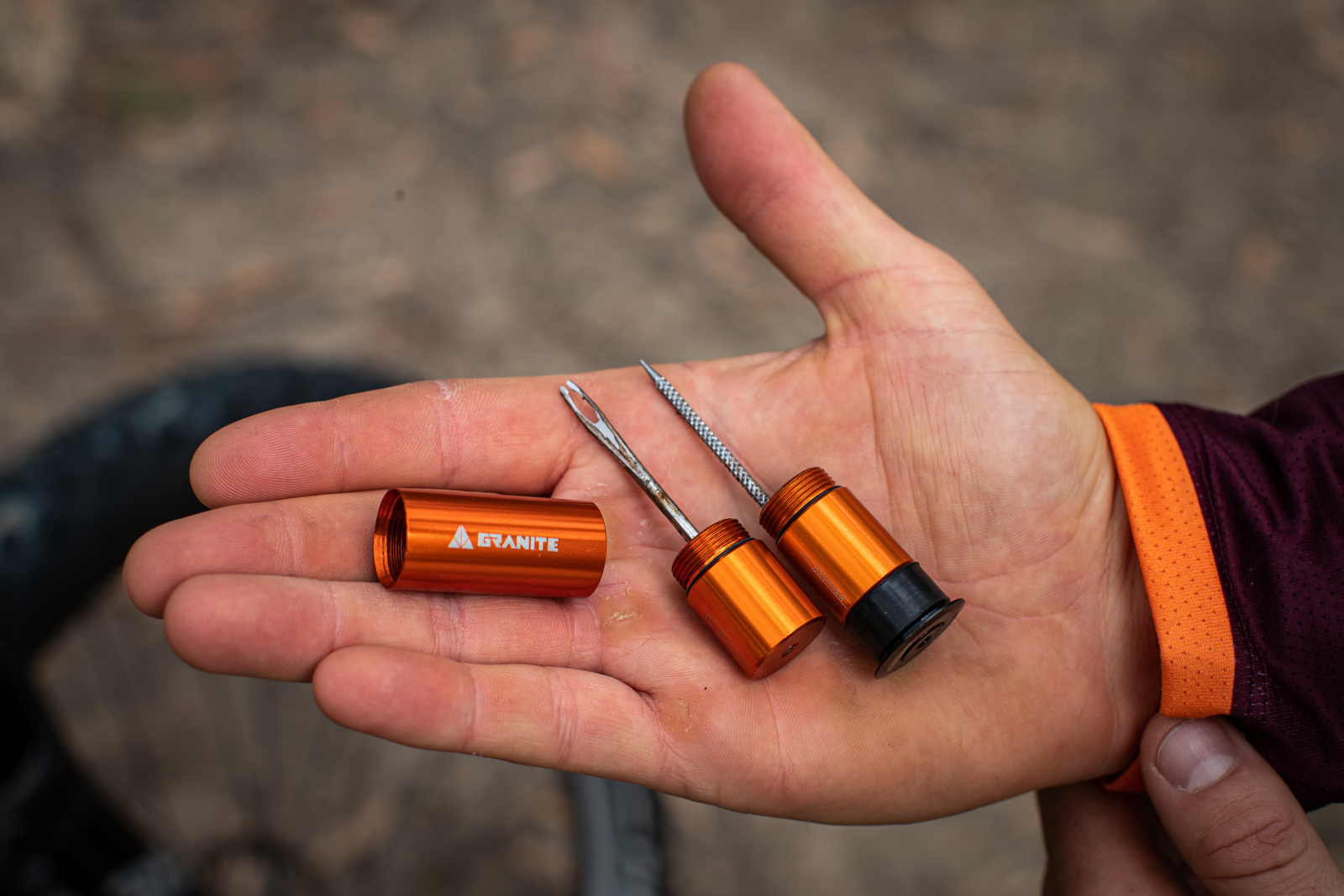
Price: $29.95
From: http://www.linksports.com.au
Hits:
- High quality construction
- Nicer integration than taping a tyre plug to your cables or having one in your pocket, especially if you don’t get flats often
Misses:
- Your tyre has gone completely flat by the time you get the plug out
One Up EDC Lite:
The One Up EDC Lite is a paired back version of their EDC (everyday carry) integrated tool, which revived the steerer tube multi-tool market in 2017. The EDC Lite is light in both weight and tool selection and promises to be the easiest of all steerer tube multi-tool installations.
The EDC Lite comes with the tool sheathed in its housing, as well as two bolts. The first bolt is rather long, and this bolt is used to push your star nut further into your steerer to accommodate the tool itself. If you own a hammer, you can install the EDC light. Simply thread in the long bolt through your top cap, tap it in straight using the hammer, and you’re good to go.
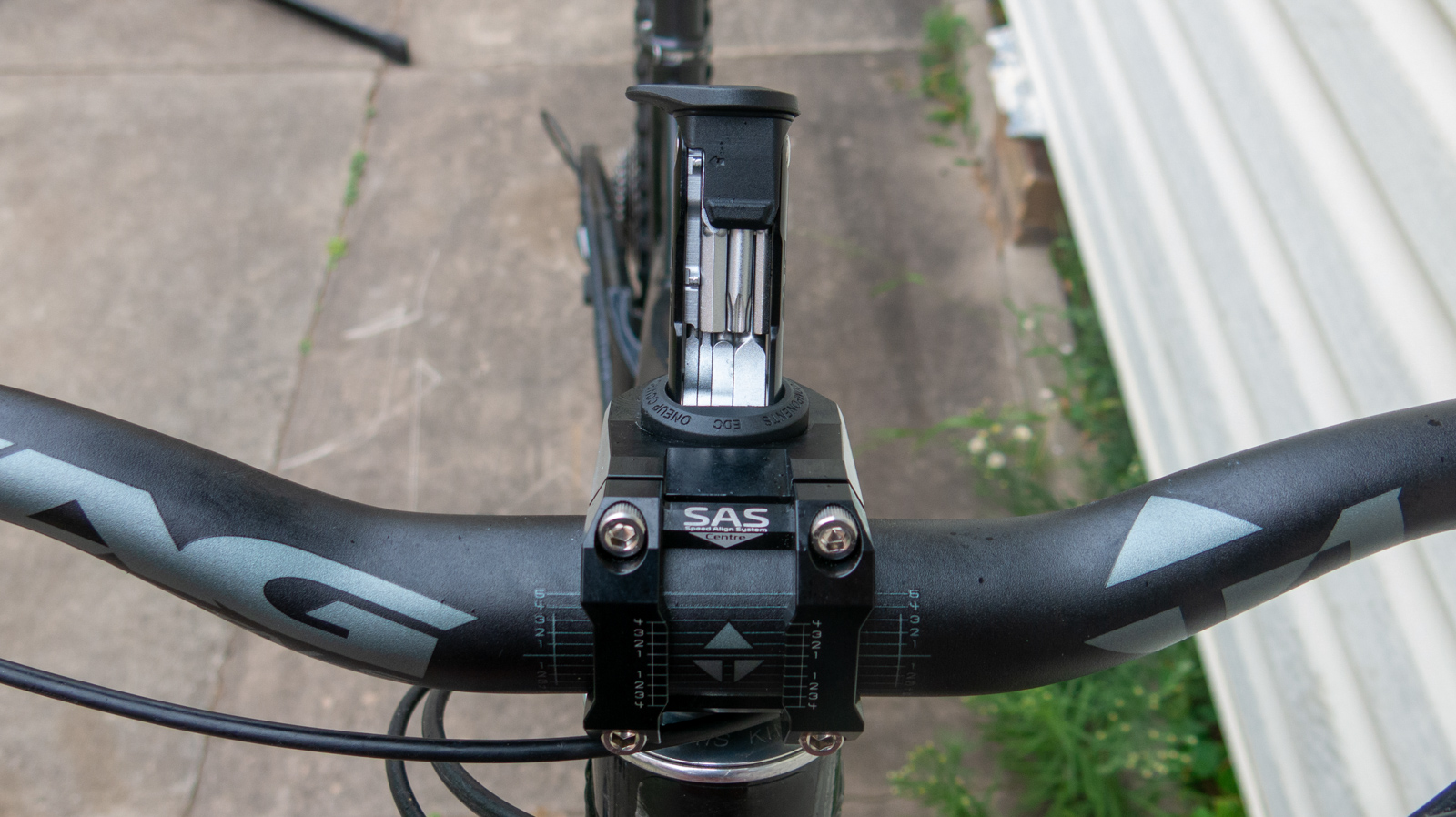
The second bolt tightens your headset, and if you need to tighten your headset on the trail, the tool’s 4mm is perfectly integrated to perform this job. For such a lithe tool, One Up have executed it quite cleverly.
Weight wise, One Up claim the EDC Lite only adds 75 grams to your bike (the total weight is 89 grams, the claimed weight is accounting for the lack of stem cap). This is pretty light compared to the Granite’s 135-gram weight, and the 164-gram Bontrager BITS.
Light in both name and nature, the EDC Lite makes some compromises when it comes to tool selection. The tool comes with 2, 2.5, 3, 4, 5, 6 and 8mm allen keys, a T25, and a flat head screwdriver. The 8mm is a half contact tool combining the 5mm and flat head screwdriver similar to the BITS, but it’ll do the trick to get you out of a pickle.
Whilst I miss the lack of chain tool, spoke keys, and valve core remover (which is handy if you use a threaded pump that pulls out valve cores), the EDC lite does a remarkable job of fitting these tools in a light package.
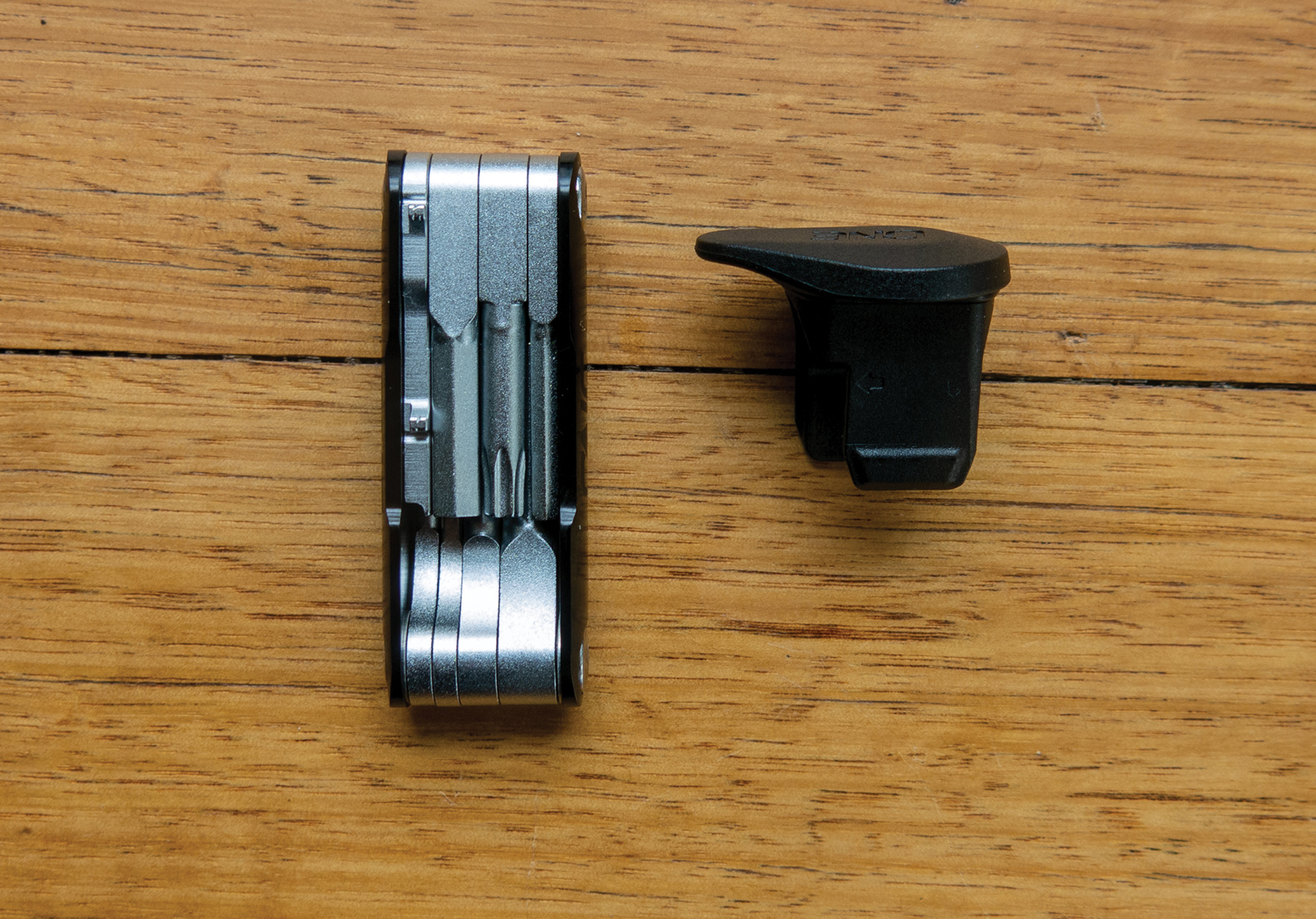
The tool bits themselves are the best out of all three tools, with a bit of extra length providing better leverage and an easier fit into different components on your bike.
The EDC lite comes in 7 colours, and retails for $64.95 exclusively through MTB Direct.
Price: $64.95
From: https://www.mtbdirect.com.au/
Hits:
- Not needing to remove the star nut will make home mechanics more comfortable during installation
- Cleverly designed tool that does almost everything you need in lightweight package
- The easiest tool to work with out of the three tested
Misses:
- No chain tool
One Up EDC V2:
As I mentioned at the start of this feature, One Up also do their full-on EDC V2 tool. The EDC V2 comes with all the same tools as the EDC Lite as well as a tyre lever, chain tool, quick link storage, 4 spoke keys, a valve core remover, and space for a C02 cartridge or other goods.
The EDC V2 can be used in the steerer tube, and it can also be stored inside One Up’s 100cc pump! Whilst I haven’t used this pump personally, multiple sources have informed me it’s the best mini pump they’ve ever used for mountain biking.
The EDC V2’s total cost is $183.85, as a tap kit and top cap kit are required to be purchased separately to install the unit. The cost of the V2 with the 100cc pump is $178.90, and the weight of those two items combined is 290 grams. For anyone except for pure XC racers, the two birds with one stone pump and tool setup looks like a good one.
Price: $183.85/$178.90
From: https://www.mtbdirect.com.au/
Hits:
- All the tools
- Pump integration is clever and practical
- Multiple options are always handy
Misses:
- Steerer integration is the most complex
- Both options are expensive
Specialized RBX Adventure Bib Short:
The integrated tools take care of the tools you might need out on the trail. But there are a few other things you’ll need to get you out of trouble, as well as keep you spinning the pedals. Whilst a tube can be strapped to your frame, something like Specialized’s RBX Adventure Bib shorts can also do the trick. Some other things to consider are a mini pump and bottle (which can both be bolted to most bikes), but most importantly, food!
The RBXs feature three rear pockets, one zipped rear pocket, two thigh pockets, and two pockets to the side of the bib straps that sit just above your waist. Whilst most bikes will accept a water bottle cage, sometimes a second (and even third) water bottle is handy, and I found the rear middle and left pockets of these bibs perfect for that task. The zipped pocket is above the middle pocket, and I found this useful for both my keys and phone, as storing the phone in this position isn’t restrictive on your pedalling like having it in your pocket. I used the left and right-hand pockets for bars, bananas, and whatever other food I was taking on a ride.
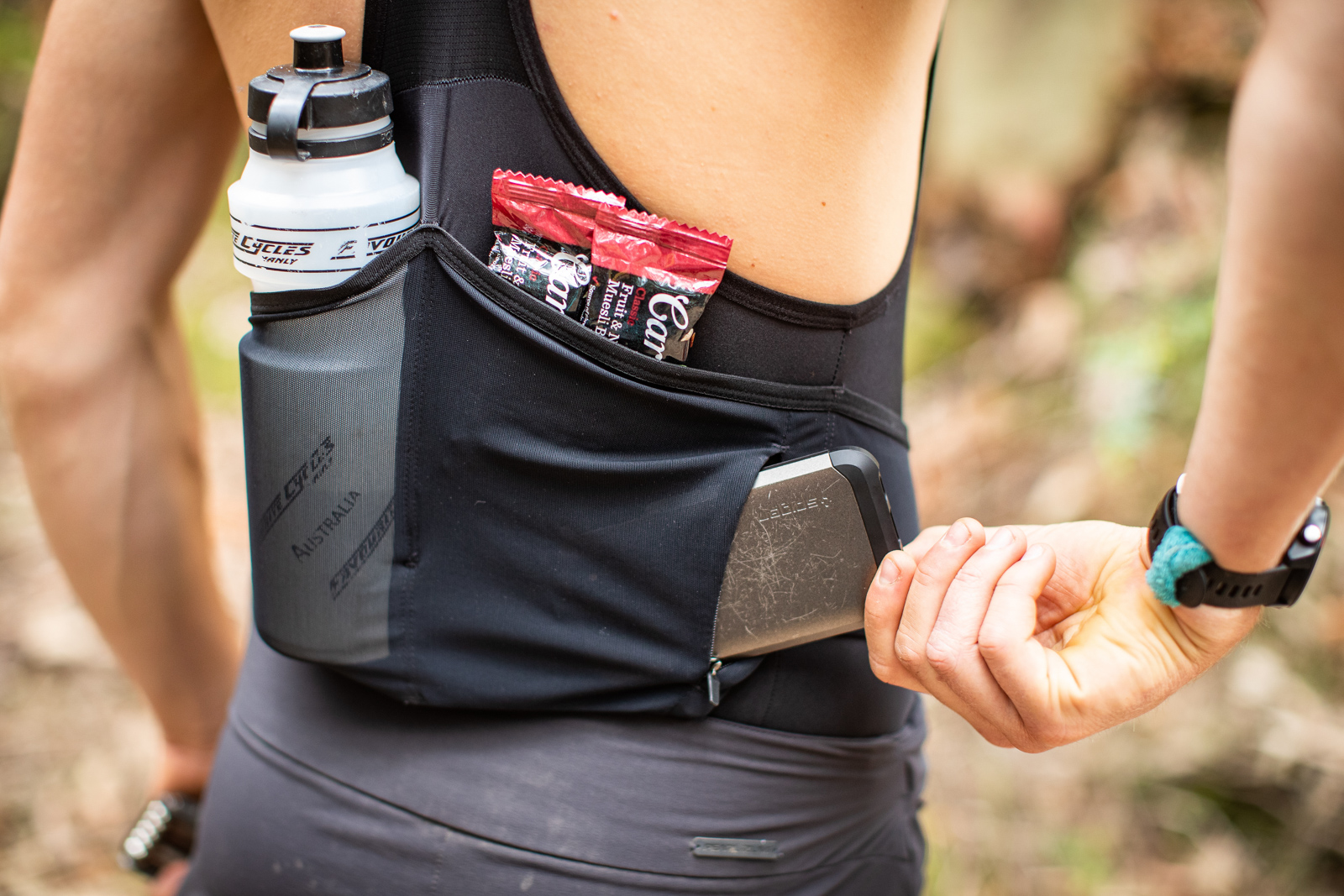
Another use for the rear left pocket was a mini pump. My personal preference is to have my mini pump fitted to the bottle cage mounts on a bike, but my Lezyne Sport Drive Mini HV just fit in the left-hand rear pocket. Combined with the Backcountry Research Mutherload strap, I had everything I needed to fix a flat out on the trail.
There are also two thigh panel pockets, which are made of mesh to keep the temperature down. I found these handy to store, you guessed it, more food! Although all of my personal and test bikes now have multi tools stuffed in their steerers, in the past I’ve used these pockets to store a multi-tool, as I found this position less intrusive for pedalling than my pocket.
The fit is as per Specialized’s website, which is nice. The website recommended the medium for me, and the bibs fit well from the outset. The material of the bibs is four way stretch, and it feels quality on the skin. The cuff doesn’t ride up, which is nice, and by and large the quality reflects the $220 price tag. One area of the bibs that didn’t agree with me and hasn’t in previous pairs of these bibs I’ve owned is the chamois. I find the chamois in these bibs a touch firm and non-conforming, however that’s more of a personal opinion, you might love them!
Overall, Specialized were the first on the bib storage scene, and their execution of this genre of bib has continued to progress. A set of SWAT bibs allows you to carry plenty of spares, food, and whatever else it is you bring riding in an ergonomic way.
Price: $220
From: https://www.specialized.com/au/en
Hits:
- Plenty of space for everything you could need
- Weight is cleverly dispersed
- Zipped pocket is useful for valuables
Misses:
- The chamois isn’t my cup of tea
Backcountry Research Mutherload Strap:
Backcountry Research’s Mutherload Strap is a simple product that does a simple job. Despite the simplicity of the product, the Mutherload Strap deserves credit for doing exactly what it’s supposed to.
I load up my Mutherload Strap with a spare tube and two tyre levers, and due to the length of the strap I’ve been able to strap it onto the top tube and downtube of every bike I’ve ridden in the last two years.
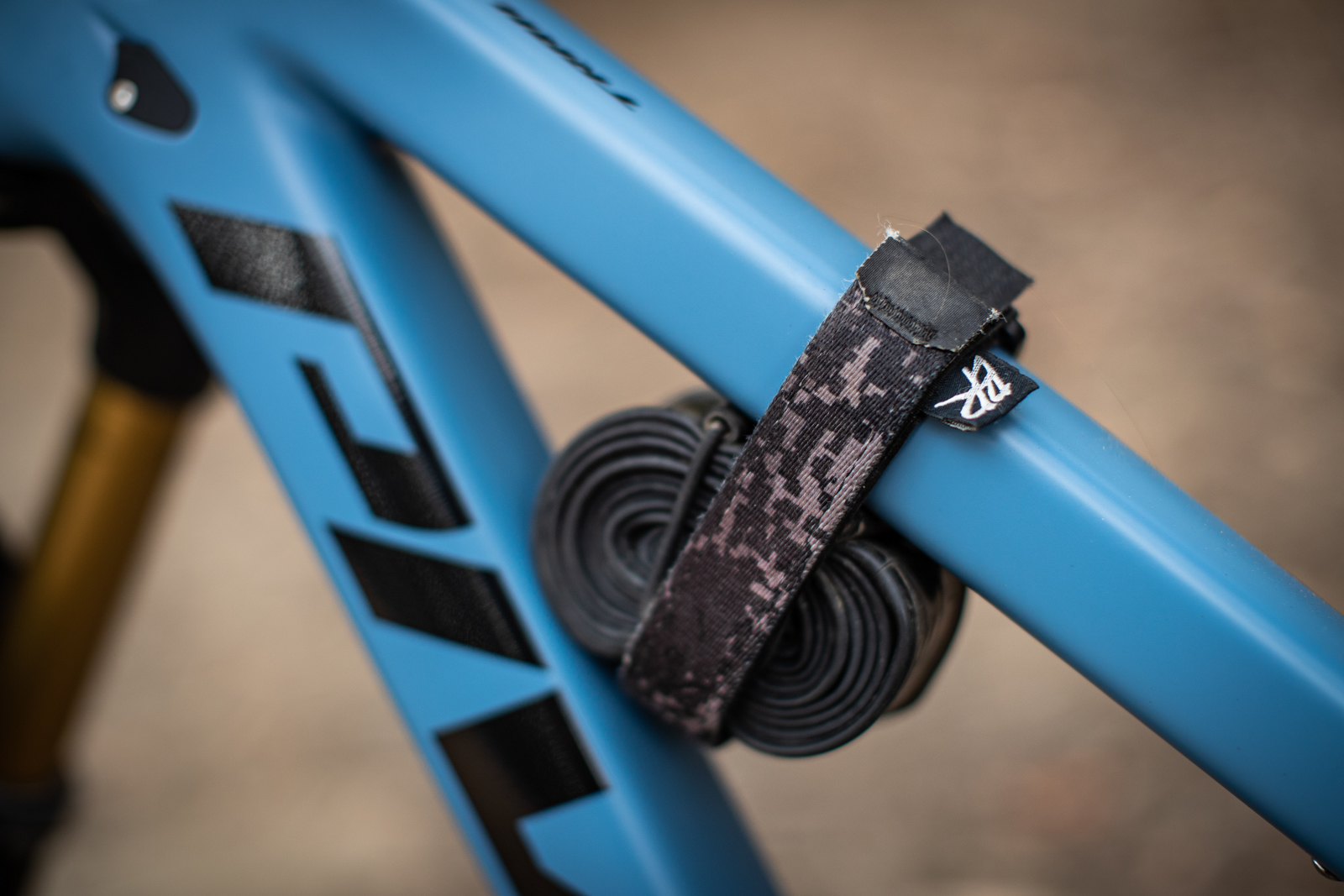
Durability wise, I ride in all-weather, and have thrown the strap through the wash multiple times. It still looks new and shows no sign of the hundreds of rides it’s been on in all weather conditions.
My only negative comment about using a Backcountry Research strap is that I would recommend checking the tube every six months or so. Being exposed to the elements, trail debris, and potentially rubbing as you pedal means that tubes can perish when strapped to your frame.
The last thing you’d want is to be lugging around a tube that’s no use to you. To counter this, I’ll check my tube every 6 months or so. I also use a few rounds of electrical tape to cover where the tyre levers sit on top of the tube, as the levers can rub through the tube over a period of time.
Price: $31.99
From: https://www.leadoutsports.com.au
Hits:
- Relatively cheap on bike storage solution
- Fits every bike I’ve ever used it on
- Durable
Misses:
- Kills tubes faster than if they’re in a pack
What’s best for you?
Overall, it’s a matter of priorities when it comes deciding what products are the best fit for you in the quest to ride packless. There’s never been more options on the market for ditching your pack and riding bare backed with all the spares you need. I wouldn’t hesitate to recommend any of the products I reviewed in this feature, and there’s plenty of other options on the market with different tool variations for your specific needs.
After more gear reviews and tech content? Click here.

